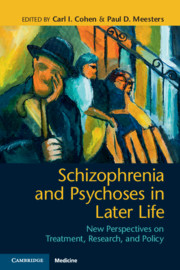Book contents
- Schizophrenia and Psychoses in Later Life
- Reviews
- Schizophrenia and Psychoses in Later Life
- Copyright page
- Contents
- Contributors
- Preface
- Acknowledgments
- Section 1 Epidemiology, Historical Background, Illness Phenomenology, and Diagnostic Issues
- Section 2 Biological, Neurocognitive, and Medical Aspects
- Section 3 Outcome and Course
- Section 4 Social Functioning and Mood
- Section 5 Treatment and Services
- 12 Community Treatment Needs
- 13 Treatment of Schizophrenia and Psychoses in Older Adults: Psychopharmacological Approaches
- 14 Model Programs and Interventions for Older Adults with Schizophrenia
- 15 Changing Caregiver Needs with Increasing Age of People with Schizophrenia
- 16 Personal Accounts of Living with Schizophrenia across a Lifetime: Coping Strategies and Subjective Perspectives
- 17 The Care of Older Adults with Schizophrenia in Developing Countries
- Section 6 Health Policy and Research: Future Directions
- Index
- References
16 - Personal Accounts of Living with Schizophrenia across a Lifetime: Coping Strategies and Subjective Perspectives
from Section 5 - Treatment and Services
Published online by Cambridge University Press: 15 March 2019
- Schizophrenia and Psychoses in Later Life
- Reviews
- Schizophrenia and Psychoses in Later Life
- Copyright page
- Contents
- Contributors
- Preface
- Acknowledgments
- Section 1 Epidemiology, Historical Background, Illness Phenomenology, and Diagnostic Issues
- Section 2 Biological, Neurocognitive, and Medical Aspects
- Section 3 Outcome and Course
- Section 4 Social Functioning and Mood
- Section 5 Treatment and Services
- 12 Community Treatment Needs
- 13 Treatment of Schizophrenia and Psychoses in Older Adults: Psychopharmacological Approaches
- 14 Model Programs and Interventions for Older Adults with Schizophrenia
- 15 Changing Caregiver Needs with Increasing Age of People with Schizophrenia
- 16 Personal Accounts of Living with Schizophrenia across a Lifetime: Coping Strategies and Subjective Perspectives
- 17 The Care of Older Adults with Schizophrenia in Developing Countries
- Section 6 Health Policy and Research: Future Directions
- Index
- References
Summary
- Type
- Chapter
- Information
- Schizophrenia and Psychoses in Later LifeNew Perspectives on Treatment, Research, and Policy, pp. 200 - 211Publisher: Cambridge University PressPrint publication year: 2019

